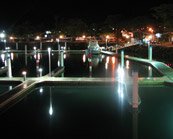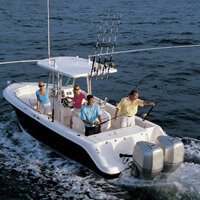Aside from serving as the perfect excuse to spend quality time amid some of the most spectacularly beautiful and diverse environments on the planet, saltwater sport fishing is also a great way to put a tasty dinner on the table. Here’s a selection of the best places for you to get started.
Kayak Fishing
Kayaks are certainly the cheapest way to get afloat, though not necessarily an ideal start for a novice. At first, go fishing in company, and take local advice before you launch at any new area. Stick to sheltered backwaters and estuaries, keeping well away from tidal inlets and rips. You’ll need to provide your own tackle and bait, typically a couple of light to medium spinning outfits to cast either lures or bait for species like redfish, striped bass, bluefish, speckled trout and snook.
Party Boats
Party boats are the perfect introduction to saltwater sport fishing for the novice angler. Party or “head” boats can fish up to several dozen anglers and sail from many harbors. The cost is typically $50-$100 a day and includes tackle, bait and assistance from an experienced crew. Many party boats are large and stable, and feature a crew cabin serving hot food and drinks. Depending on location, expect a variety of species, from snapper and grouper to small tuna, mackerel, dolphin, cobia and cod.
Inshore/Bay Fishing
Fish aboard fast sport-fishing boats, which can be chartered by an individual or group of up to four anglers. Tackle and bait are provided, and so are expert hands-on instruction and advice from a qualified captain. Depending on location, weather and target species, you’ll fish from nearshore to several miles offshore. As a result, it’s a great way to learn basic offshore fishing techniques such as trolling, drifting and fishing at anchor, and to become competent at hooking, fighting and releasing larger sporting gamefish such as sailfish, tarpon, tuna and sharks using balanced tackle. A great option for private boat owners looking to go solo.
Blue Water/Deep Sea/Big Game Fishing
This is arguably the pinnacle of saltwater angling. Fish many miles offshore in deep blue water for apex species such as marlin, tuna and shark that can exceed 1,000 pounds. It isn’t cheap, but charter costs can be split. Expect an experienced captain, plus one or two mates to rig tackle and baits and assist with hooked fish. Conditions many miles offshore can be challenging, so it’s probably best to defer your first offshore trip until you know how comfortable you are aboard a boat.
Backcountry/Flats Fishing
Backcountry or flats fishing is unique to certain parts of the U.S. coastline such as the Florida Keys. Backcountry or flats boats generally focus on fishing shallow “skinny water” flats as well as sheltered bays and deeper connecting channels, often in the vicinity of mangroves. Techniques include casting lures and bait using light tackle — generally provided — often to fish that are visible. Widely associated with fly fishing, a flats boat is not a great place to learn how to cast a fly rod, so it’s best to arrange for a few lessons beforehand. If you’re uncomfortable on the open ocean, fishing the backcountry and flats is the way to experience the excitement of stellar species like tarpon, bonefish, permit, snook and redfish.
Pier and Bridge Fishing
Fishing from a pier or bridge is an affordable and convenient way to enjoy a couple of hours of saltwater fishing, and is ideal for the whole family. A medium to heavy spinning rod or purpose-made pier rod is ideal for a wide variety of different species. You’ll need to provide your own bait and tackle. Lots of help is usually available from pier regulars, making this the perfect choice for the novice or junior angler.
Surf Fishing
Surf fishing involves casting various baits, lures and flies from a sandy beach or rocks, making it one of the most enjoyable ways to fish the salt. Expect species such as striped bass, redfish, flounder and bluefish. You’ll need basic angling skills and your own tackle, ranging from specialist beach-casting surf rods to spinning or fly outfits. In some areas, surf guides are available and are a great option for a novice. Local tackle shops are an excellent source of advice on specific marks, tides and baits, and various techniques.


